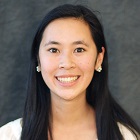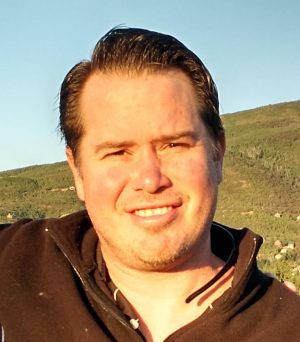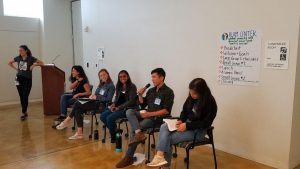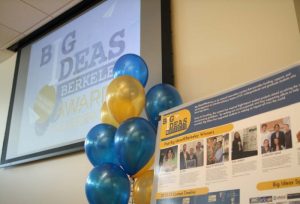 Anh-Thi Le joined the Blum Center in September 2013 as a program coordinator for the Development Impact Lab after graduating from UC Berkeley with a B.A. in Political Science and a Minor in Global Poverty & Practice. As part of an ongoing series with Blum Center faculty, students, and staff, we asked her about her work in poverty action and education.
Anh-Thi Le joined the Blum Center in September 2013 as a program coordinator for the Development Impact Lab after graduating from UC Berkeley with a B.A. in Political Science and a Minor in Global Poverty & Practice. As part of an ongoing series with Blum Center faculty, students, and staff, we asked her about her work in poverty action and education.
Q: What compelled you to focus on public service and poverty alleviation?
Anh-Thi Le: I have always been interested in public service, but it wasn’t until I came to UC Berkeley that it became a career choice. Inspired by Professor Robert Reich’s class on income inequality in the United States, I spent my first two years as an undergrad working with domestic-focused nonprofits—advocating for Asian Pacific American issues in Washington, D.C., developing re-entry services for ex-offenders in Philadelphia, and providing cancer education and awareness on campus. While my work experiences varied, the one constant was a curiosity about how to effectively address and alleviate poverty, not just domestically but internationally as well. I found myself wondering: How can policies be more effective and have greater impact in resource-poor communities? How can we build better bridges between policymakers and community members to ensure that policies reflect the needs of a community? These were some of the questions that motivated me to enroll in Global Poverty & Practice 115 class taught by Professor Ananya Roy, who, by the way, never provided neat answers. Her class inspired me to enroll in the Global Poverty & Practice Minor, to continue engaging in discussions about global poverty and inequality.
Q: What is particular or unusual about the Global Poverty & Practice Minor?
Anh-Thi Le: Being part of the minor is extremely challenging and thought provoking. It exposed me to the international development space, which allowed me to align my public service interests with my international political science studies. Perhaps most important, the minor connected me to people who are equally passionate and committed to social justice and from various academic and cultural backgrounds. I met students majoring in business, physics, chemistry, social welfare, sociology, and environmental sciences—students whom I otherwise would not have met. Together, we discussed the ethics and methods of poverty alleviation; we framed our perspectives about development (through power, privilege, and sustainability, to name a few); we challenged each other (and sometimes our professors); and we spent hours yelling, critiquing, and discussing the frustrations that came with participating in three-month practice experiences. The Global Poverty & Practice Minor provided a trans-disciplinary ecosystem that allowed for holistic discussion, learning, and practice of development issues. This approach is what makes it and the Blum Center so unique.
Q: How did you come to work at a Blum Center project?
Anh-Thi Le: When I was in India in June 2012, conducting my GPP practice experience with Nest, a U.S.-based nonprofit organization committed to empowering women through market access and capacity building initiatives, my minor advisor notified me about a student position available with CellScope, a UC Berkeley lab, funded partly by the Blum Center and led by Professor Dan Fletcher, which was focused on turning a cellphone into a mobile microscope for disease diagnosis in low-resource regions. A one-year study of the CellScope device was to be conducted in Vietnam, and Fletcher’s group was looking for a Vietnamese-speaking student assistant to help support the project. Luckily, my parents, who came to the U.S. in 1975 following the Viet Nam war, had put me through six years of Vietnamese language classes in California and I got the job. While I was extremely excited to work on a global health initiative, I also remember feeling nervous about my qualifications. On the one hand, how could a political science student with little background in global health technology work in a bioengineering lab? On the other hand, the opportunity allowed me to align my passion in the social and economic development of South and Southeast Asia, with an interest in learning more about the role of technology in international development. The first few weeks in the lab were certainly challenging. The CellScope integrates standard microscope options with the visual interface and wireless data capabilities of a mobile phone. With its durable construction, battery power, and ability to digitally record and wirelessly transmit test results, CellScope allows for screening of patients in rural health centers that previous lacked the tools to diagnose TB. For someone who has fairly little technical expertise in this area, the support I received from the CellScope team made the learning curve that much easier.
Q: How did you use your Vietnamese language skills for the CellScope project?
Anh-Thi Le: Neil Switz, then a postdoc with the Fletcher Lab and now a faculty member at Evergreen State College, and I conducted weekly Skype calls late at night with Dr. Ha Phan, UCSF’s in-country representative in Vietnam, to troubleshoot any problems with the device. We spent hours replicating, testing, and solving errors when problems arose with the software and hardware, reviewed hundreds of images to conduct quality control, and created countless manuals and instruction guidelines on everything from computer usage to reading sputum slides to support Dr. Ha and the Vietnam National Tuberculosis Program staff. While my Vietnamese skills may have allowed the CellScope team to overcome any language barriers, I must note that Dr. Ha spoke English fluently, had professional public health experience in both Vietnam and the U.S., and ultimately served as a tremendous asset and collaborator for the project.
Q: How did you come to work as a program coordinator at the Development Impact Lab, and what do you do there?
Anh-Thi Le: I began working as a program coordinator for the Blum Center’s Development Impact Lab in September 2013. I had recently graduated from UC Berkeley and knew I wanted to continue working in the global development space. After spending a year with CellScope, I became increasingly interested in the role of technology and university-based innovations in international development. Working for DIL and the Blum Center seemed like a natural fit. In my role as a program coordinator, I support DIL’s student engagement programs and organize various programs, including the DIL Salons, DIL Workshops, and Practitioners in Residence.






